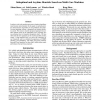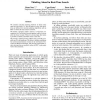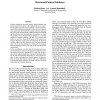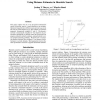90
Voted
AIPS
2009
15 years 1 months ago
2009
Temporally expressive planning, an important class of temporal planning, has attracted much attention lately. Temporally expressive planning is difficult; few existing planners ca...
89
Voted
AIPS
2009
15 years 1 months ago
2009
In order to scale with modern processors, planning algorithms must become multi-threaded. In this paper, we present parallel shared-memory algorithms for two problems that underli...
60
Voted
AIPS
2009
15 years 1 months ago
2009
70
Voted
AIPS
2009
15 years 1 months ago
2009
While several powerful domain-independent planners have recently been developed, no one of these clearly outperforms all the others in every known benchmark domain. We present PbP...
67
Voted
AIPS
2009
15 years 1 months ago
2009
92
Voted
AIPS
2009
15 years 1 months ago
2009
Current state-of-the-art planners solve problems, easy and hard alike, by search, expanding hundreds or thousands of nodes. Yet, given the ability of people to solve easy problems...
95
Voted
AIPS
2009
15 years 1 months ago
2009
This paper considers Just-In-Time Job-Shop Scheduling, in which each activity has an earliness and a tardiness cost with respect to a due date. It proposes a constraint programmin...
60
Voted
AIPS
2009
15 years 1 months ago
2009
N-gram analysis provides a means of probabilistically predicting the next item in a sequence. Due originally to Shannon, it has proven an effective technique for word prediction i...
96
Voted
AIPS
2009
15 years 1 months ago
2009
abstraction heuristics, notably pattern-database and merge-and-shrink heuristics, are employed by some state-ofthe-art optimal heuristic-search planners. The major limitation of t...
73
Voted
AIPS
2009
15 years 1 months ago
2009
This paper explores the use of an oft-ignored information source in heuristic search: a search-distance-to-go estimate. Operators frequently have different costs and cost-to-go is...




